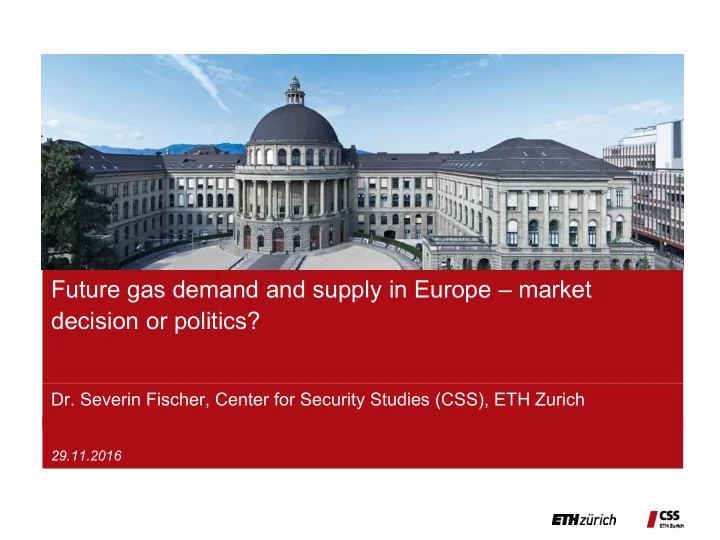

Future gas demand and supply in Europe – market decision or politics? Dr. Severin Fischer, Center for Security Studies (CSS), ETH Zurich 29.11.2016
Structure 1. Global framework: COP21 and changing markets 2. The EU’s approach: All new with the Energy Union? 3. Difficult decisions to take: Pipeline politics as the new normal? 2 Dr. Severin Fischer, 29.11.2016
Global Framework The Paris Agreement at COP21: - Aim to limit global warming to no more than 2 ° C with a perspective to go to 1.5 ° C - Based on INDCs/NDCs and a comprehensive approach targetting all UNFCCC members (not just industrialised countries) - Global stock-take every 5 years and review with the aim to increase ambition 3 Dr. Severin Fischer, 29.11.2016
Global Framework INDCs and the question of consistency with 2 ° C and 1.5 ° C Source: UNFCCC INDC Assessment 2016 4 Dr. Severin Fischer, 29.11.2016
Global Framework The carbon budget is getting smaller Source: UNFCCC INDC Assessment 2016 5 Dr. Severin Fischer, 29.11.2016
CSS is becoming crucial to remain consistent Source: Peters G., Nature Climate Change (2016), doi:10.1038/nclimate3000 6 Dr. Severin Fischer, 29.11.2016
Global Framework Inconsistency between targets and mitigation pathways is growing Climate action will strongly dependend on regional or national policies (increased by Trump-effect) If the world would be consistent on targets and mitigation, the corridor for natural gas without CSS would be very small 7 Dr. Severin Fischer, 29.11.2016
Global Framework Global market conditions for natural gas have improved massively over the last decade Growth in LNG trade, low prices, break-up of monopolies, increasing inflexibility: positive developments on the side of gas consuming/importing regions Very favourable market conditions for natural gas consumers overall in the mid-term 8 Dr. Severin Fischer, 29.11.2016
Energy Union The «Regulatory State»: The EU’s success model for gas market integration Contrary to developments on a global scale («Renationalization», «state companies»), the EU tried to design, order and maintain a single EU gas market since the beginning of the 1990s The idea behind creating a single market was also to «depoliticize» gas trade, reduce costs and increase security through internal flexibility Natural gas to become a normal commodity 9 Dr. Severin Fischer, 29.11.2016
Energy Union The EU Commission’s main tools in natural gas policy Competition Policy: Increased transparency on gas trade Delete destination clauses Market Regulation: Unbundling rules Creation of independent national regulators N-1 infrastructure provision as security measure Infrastructure Support: Reverse-flow mechanisms LNG facilities Creating a functioning EU market environment as the agreed common feature among all EU member states 10 Dr. Severin Fischer, 29.11.2016
Energy Union Success stories around the EU’s gas market: Increase of flexible spot-trading in the EU Growth in LNG import West-East gas flow option (eg for Ukraine) Ending the isolation of markets (eg Baltic states) Shortcomings: Exporting the regulatory state model (except Energy Community) Being a relevant political actor in energy geopolitics 11 Dr. Severin Fischer, 29.11.2016
Energy Union 12 Dr. Severin Fischer, 29.11.2016
Energy Union EU gas exports to Ukraine through West-East-flows Source: IEA 2016 13 Dr. Severin Fischer, 29.11.2016
Energy Union Why did the concept of the «Energy Union» enter the EU policy sphere in 2014/15? Contiuing conflicts about «decarbonization and transformation» on the one hand and a more political energy policy vis-à-vis Russia on the other hand Commission deal to get both and keep market approach at the same time 14 Dr. Severin Fischer, 29.11.2016
Energy Union Decarbonization in addition to EU ETS + Securitization of natural gas 15 Dr. Severin Fischer, 29.11.2016
Energy Union Challenges for natural gas in the context of the «Energy Union» Less influence of EU ETS and carbon price signals and more influence by diverging national regulations (energy efficiency), subsidy systems (RES and coal), free allocations in ETS sectors Over-politicization of natural gas as «security problem» leads to non-market behaviour (eg exclusion of specific sources), higher prices and increases investment costs Reasons for the success of the EU’s regulatory approach in the past are being neglected 16 Dr. Severin Fischer, 29.11.2016
Pipeline Politics Nord Stream 2 Does the EU treat infrastructure projects vis-à-vis Russia differently than with other suppliers? Do we grant Ukraine a transit monopoly for Russian gas and for which reasons? In how far can a single infrastructure project be a danger for an integrated large gas market? On which basis are we trying to stop competition for EU customers? 17 Dr. Severin Fischer, 29.11.2016
Pipeline Politics Southern Corridor and Turkey Turkey might gain a strategic transit role for gas supplies to South-East Europe Potentially decisive for deliveries from Aserbaijan (hypothetically Central Asia/Iran), Russia and Cyprus/Israel Strategically, in the «new gas world», transit countries have more bargaining power than ever before 18 Dr. Severin Fischer, 29.11.2016
Key Messages The role of natural gas in the future strongly depends on the consistency of targets and measures, but also on the deployment of CCS and more innovation in the sector Europe should make use out of its favourable position in present day world gas market by sticking to its liberal market model and not politicize gas trade If politics and not markets control supply and demand, this will harm natural gas use in general due to higher costs and inefficiencies Europe should assess the role of transit countries and their bargaining power vis-à-vis supplier countries in a more critical and risk-aware way 19 Dr. Severin Fischer, 29.11.2016
Contact E-Mail: severin.fischer@sipo.gess.ethz.ch Twitter: @FischerSeverin 20 Dr. Severin Fischer, 29.11.2016
Recommend
More recommend